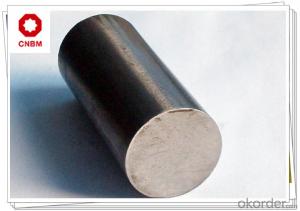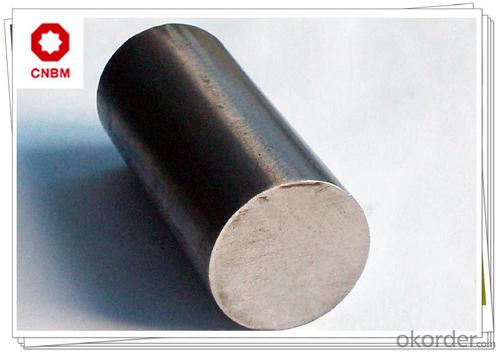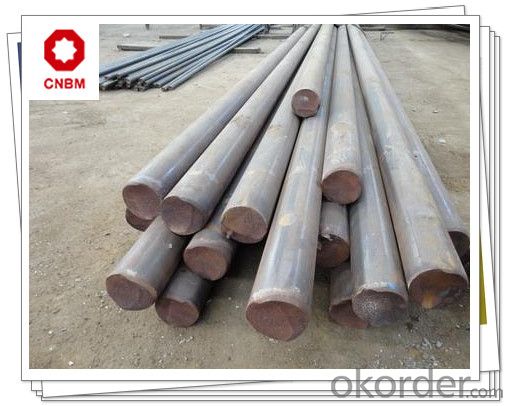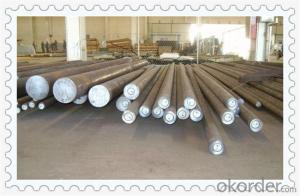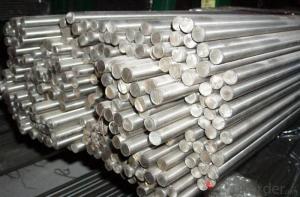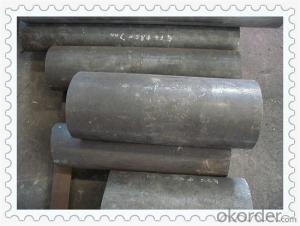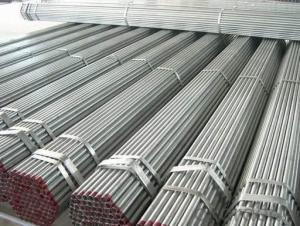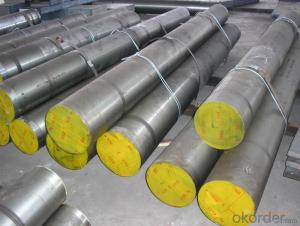AISI 5140 Alloy Steel Round Bars
- Loading Port:
- Shanghai
- Payment Terms:
- TT OR LC
- Min Order Qty:
- 30 m.t.
- Supply Capability:
- 120000 m.t./month
OKorder Service Pledge
OKorder Financial Service
You Might Also Like
ASTM 5140 Alloy Steel Round Bar
Specification
Chemical Composition | Mechanical Properties (In Quenched & Tempered State) | ||
C | 0.37-0.44 % | Tensile strength(MPA) | ≥980(100) |
Si | 0.17-0.37 % | Yield strength (MPA) | ≥785(80) |
Mn | 0.50-0.80 % | Elongation (δ5/%) | ≥9 |
Cr | 0.80-1.10 % | Reduction in Area (ψ/%) | ≥45 |
Ni | ≤0.30 % | Impact (J) | ≥ 47 |
P | ≤0.035 % | Impact toughness value αkv (J/cm2) | ≥59(6) |
S | ≤0.035 % | Hardness | ≤207HB |
Cu | ≤0.030 % | ||
Detailed Information
1, Standard: GB, ASTM, AISI, SAE, DIN, JIS, EN
2, Produce Process: smelt iron - EAF smelt billet - ESR smelt billet -
hot rolled or forged to get the steel round bar and plate
3, Heat Treatment: annealing, normalizing, tempering, quenching
4, Surface Treatment: Black, Polished, Galvanized
5, Quality Assurance: We accept third party inspection for all orders.
You can ask testing organizations such as SGS, BV, etc. to test our products before shipping.
Products Show
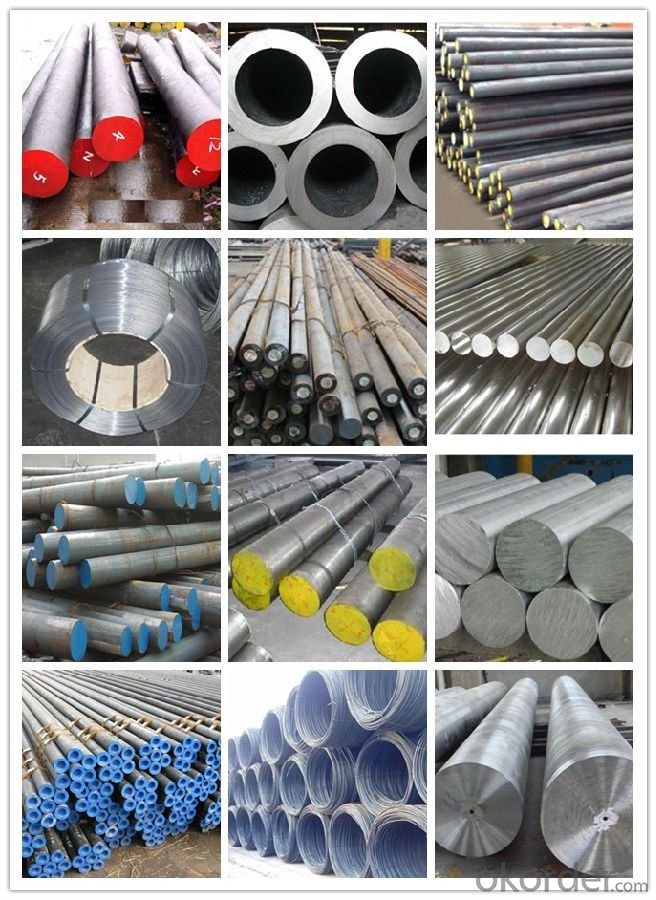
Product Overviews
Product Name | Typical Grades | Diameter(mm) | Standard adopted |
Carbon Steel | 20 (1020/S20C/C22) |
Ø16-Ø300 |
GB/SAE/JIS/DIN |
40 (1040/S40C/C40) | |||
45 (1045/S45C/C45) | |||
Bearing Steel | GCr9 (51100/SUJ1) |
Ø12-Ø250 | |
GCr15 (52100/SUJ2/100Gr6) | |||
GCr9SiMn (A485-Gr.1/SUJ3) | |||
Cr-Mo Steel | 20Cr (5120/SCr420H/20Cr4) |
Ø12-Ø250 | |
40Cr (5140/SCr440/41Cr4) | |||
42CrMo(4140/SCM440/42CrMo4) | |||
Gear Steel | 20CrNiMo |
Ø16-Ø600 | |
20CrMn(5115/SMnC420/20MnCr5) | |||
20CrNiMo(8620/SNCM220/20CrMiMo2) |
Application
| Carbon Steel | Mold bottom, Plastic mold, Construction machinery parts Automobile parts, Security grills, Screens, Construction |
| Bearing Steel | Aerospace, Navigation, Nuclear energy, Chemical industry Electronic information, Petrochemical, Instrument and meter Transportation |
| Cr-Mo Steel | Mechanism & Fasteners gear, Stressed components for vehicles Engines and machines, Parts of larger cross-section |
| Gear Steel | All kinds of gears, Statically and dynamically stressed component for vehicles Engines and machine, Larger cross-section parts, Crankshafts |
Work Shop

Company Information
CNBM International Corporation is the most important trading platform of CNBM group.
Whith its advantages, CNBM International are mainly concentrate on Cement, Glass, Iron and Steel, Ceramics industries and devotes herself for supplying high qulity series of refractories as well as technical consultancies and logistics solutions.


FAQ
1, Your advantages?
professional products inquiry, products knowledge train (for agents), smooth goods delivery, excellent customer solution proposale
2, Test & Certificate?
SGS test is available, customer inspection before shipping is welcome, third party inspection is no problem
3, Factory or Trading Company?
CNBM is a trading company but we have so many protocol factories and CNBM works as a trading department of these factories. Also CNBM is the holding company of many factories.
4, Payment Terms?
30% TT as deposit and 70% before delivery.
Irrevocable L/C at sight.
5, Trading Terms?
EXW, FOB, CIF, FFR, CNF
6, After-sale Service?
CNBM provides the services and support you need for every step of our cooperation. We're the business partner you can trust.
For any problem, please kindly contact us at any your convenient time.
We'll reply you in our first priority within 24 hours.
Packaging & Delivery
1, Packaging: seaworthy package or as required
2, Delivery: 35-45 days or based on quantity

- Q: What are the advantages of using nickel-manganese alloy steel round bars?
- Nickel-manganese alloy steel round bars provide numerous benefits in various applications. To begin with, these round bars exhibit exceptional strength and toughness. The incorporation of nickel and manganese significantly enhances the overall strength and durability of the steel, rendering it suitable for heavy-duty applications that demand high strength and resistance to wear and tear. As a result, industries such as construction, automotive, and manufacturing find these alloy steel round bars highly advantageous. Additionally, nickel-manganese alloy steel round bars possess outstanding corrosion resistance properties. The nickel content in the alloy imparts remarkable resistance to corrosion, making it ideal for use in harsh environments or situations where exposure to corrosive substances is common. Consequently, the lifespan of these round bars is extended, reducing the need for frequent maintenance or replacement. Moreover, these round bars demonstrate excellent heat resistance. They can withstand elevated temperatures without compromising their structural integrity, making them suitable for applications involving extreme heat or thermal cycles. Industries like aerospace, power generation, and oil and gas greatly benefit from this heat resistance property. Furthermore, nickel-manganese alloy steel round bars offer favorable weldability and machinability. The composition of the alloy facilitates easy welding and machining, allowing manufacturers to fabricate components or structures with ease. This versatility in processing makes the round bars highly adaptable to varying manufacturing processes and requirements. Moreover, these round bars exhibit good ductility and formability. The alloy's composition permits easy shaping or forming into various configurations without sacrificing its structural integrity. Consequently, they are suitable for applications that necessitate complex shapes or intricate designs. In conclusion, the advantages of utilizing nickel-manganese alloy steel round bars encompass exceptional strength, corrosion resistance, heat resistance, weldability, machinability, and formability. These properties make these round bars a dependable and versatile choice for a broad range of applications across different industries.
- Q: What is the typical tolerance for diameter and length in steel round bars?
- The typical tolerance for diameter and length in steel round bars can vary depending on the specific industry standards and requirements. However, in general, the tolerance for diameter in steel round bars is typically around +/- 0.005 to 0.010 inches. This means that the actual diameter of the bar can be up to 0.010 inches larger or smaller than the specified diameter. Similarly, the tolerance for length in steel round bars is usually around +/- 0.125 to 0.250 inches. This means that the actual length of the bar can be up to 0.250 inches longer or shorter than the specified length. It is important to note that these tolerances can differ based on the intended application and the specific standards set by the manufacturing industry. Therefore, it is crucial to consult the relevant industry standards or the manufacturer's specifications to determine the precise tolerances required for a particular steel round bar.
- Q: Why can't the grounding device be replaced by steel bar instead of round steel?
- Steel is known as hot rolled ribbed bar. Ordinary hot rolled steel bars are made up of HRB and the minimum yield point of the brand. H, R, and B are the first letters in English for hot-rolled (Hotrolled), ribbed (Ribbed) and reinforced (Bars) three words. Hot rolled ribbed bar is divided into two levels, HRB335 (old No. 20MnSi), three HRB400 (20MnSiV, 20MnSiNb, old No. 20Mnti), four grade HRB500 three grade.
- Q: What are the advantages of using creep-resistant steel round bars?
- There are several advantages of using creep-resistant steel round bars in various applications. Firstly, creep-resistant steel round bars offer excellent resistance to high temperatures and prolonged exposure to stress. This makes them ideal for use in applications that involve high temperature environments, such as power plants, boilers, and engines. The ability to withstand elevated temperatures without losing their mechanical properties is a key advantage of creep-resistant steel round bars. Secondly, these round bars have superior creep strength, which means they can withstand constant stress over a long period of time without deforming or failing. This is particularly important in applications where the component is subjected to continuous stress, such as in pressure vessels or structural components of machinery. The high creep strength of these bars ensures the longevity and reliability of the components. Additionally, creep-resistant steel round bars have excellent corrosion resistance. They are often alloyed with elements such as chromium, molybdenum, or nickel, which enhance their resistance to corrosion in harsh environments. This makes them suitable for use in industries such as oil and gas, chemical processing, and marine applications where corrosion is a significant concern. Furthermore, creep-resistant steel round bars have good weldability, allowing for easy fabrication and assembly. They can be easily welded to other components without compromising their mechanical properties, making them versatile and cost-effective for various construction projects. Moreover, these round bars offer dimensional stability and high hardness, ensuring that the components maintain their shape and mechanical properties even under extreme conditions. This characteristic makes them suitable for use in applications that require high precision and accuracy, such as aerospace and automotive industries. In conclusion, the advantages of using creep-resistant steel round bars include their ability to withstand high temperatures, excellent creep strength, corrosion resistance, weldability, dimensional stability, and high hardness. These advantages make them a preferred choice for various industries where reliability, longevity, and performance under harsh conditions are crucial factors.
- Q: Can steel round bars be used in the manufacturing of machinery?
- Yes, steel round bars can definitely be used in the manufacturing of machinery. Steel round bars are widely used in various industries for their strength, durability, and versatility. They are commonly used to create components such as shafts, axles, gears, and other mechanical parts that require high strength and resistance to wear and tear. Steel round bars offer excellent mechanical properties, including high tensile strength and good machinability, which make them suitable for use in heavy machinery and equipment. Additionally, steel round bars can be easily welded, forged, or machined into the desired shape, making them a preferred choice for manufacturing machinery.
- Q: Can steel round bars be used in the manufacturing of jewelry?
- Steel round bars have the potential to be employed in jewelry production. Despite the fact that steel is not as frequently utilized as precious metals such as gold or silver in the creation of jewelry, it can still be employed to craft distinctive pieces with an industrial feel. The utilization of steel round bars imparts a polished and modern appearance, rendering them appropriate for contemporary or minimalist designs. Moreover, steel is renowned for its robustness and sturdiness, guaranteeing that the jewelry will endure the rigors of daily use. Nevertheless, it is worth mentioning that steel may not be suitable for individuals with metal allergies or sensitive skin.
- Q: What are the advantages of using alloy steel round bars?
- There are several advantages of using alloy steel round bars. Firstly, alloy steel has superior strength and hardness compared to regular steel, making it more durable and resistant to wear and tear. Secondly, alloy steel round bars offer excellent corrosion resistance, making them suitable for use in various environments, including marine and chemical industries. Additionally, alloy steel can withstand high temperatures, making it ideal for applications that involve heat or extreme conditions. Lastly, alloy steel round bars can be easily machined and fabricated, allowing for versatility in design and customizations.
- Q: What are the different grades of steel used for round bars?
- There are several different grades of steel that are commonly used for round bars. These grades vary in their composition and properties, making them suitable for different applications. Some of the most common grades of steel used for round bars include: 1. Mild Steel (Low Carbon Steel): This is the most basic and widely used grade of steel. It has a low carbon content, which makes it easy to work with and relatively inexpensive. Mild steel round bars are commonly used in construction, automotive, and general engineering applications. 2. Carbon Steel: This grade of steel contains higher levels of carbon than mild steel, giving it improved strength and hardness. Carbon steel round bars are often used in high-stress applications, such as structural components, axles, and shafts. 3. Alloy Steel: Alloy steel round bars are made by adding various alloying elements, such as chromium, nickel, or molybdenum, to the base steel. This enhances the strength, toughness, and corrosion resistance of the material. Alloy steel round bars are commonly used in aerospace, automotive, and machinery industries. 4. Stainless Steel: Stainless steel is a corrosion-resistant grade of steel that contains high levels of chromium. It is known for its excellent strength, durability, and resistance to rust and staining. Stainless steel round bars are widely used in the food industry, marine applications, and architectural components. 5. Tool Steel: Tool steel round bars are specifically designed to have high hardness, wear resistance, and heat resistance. They are commonly used in the manufacturing of cutting tools, dies, and molds. These are just a few examples of the different grades of steel used for round bars. Each grade offers unique properties and characteristics, allowing for a wide range of applications across various industries.
- Q: What are the advantages of using nickel-chromium alloy steel round bars?
- There are several advantages of using nickel-chromium alloy steel round bars in various applications. Firstly, nickel-chromium alloy steel round bars have excellent corrosion resistance properties. The presence of nickel and chromium elements in the alloy enhances its ability to resist corrosion from various environmental factors such as moisture, chemicals, and oxidation. This makes these round bars suitable for use in challenging environments such as marine applications, chemical processing plants, and oil refineries. Secondly, nickel-chromium alloy steel round bars offer high temperature resistance. The combination of nickel and chromium elements in the alloy allows it to withstand elevated temperatures without losing its structural integrity. This makes them suitable for use in heat exchangers, furnaces, and other high-temperature applications. Additionally, nickel-chromium alloy steel round bars have superior mechanical properties. They exhibit excellent strength, toughness, and wear resistance, making them ideal for applications that require high load-bearing capabilities. These round bars also exhibit good ductility, allowing for ease of machining and fabrication. Moreover, nickel-chromium alloy steel round bars have good electrical conductivity. This makes them suitable for electrical and electronic applications where conductivity is essential, such as in the manufacturing of resistors, heating elements, and electrical connectors. Lastly, nickel-chromium alloy steel round bars are readily available and cost-effective. As a widely used material in various industries, these round bars are easily accessible and can be obtained at competitive prices. In summary, the advantages of using nickel-chromium alloy steel round bars include excellent corrosion resistance, high-temperature resistance, superior mechanical properties, good electrical conductivity, and cost-effectiveness. These characteristics make them a preferred choice for a wide range of applications in industries such as construction, automotive, aerospace, and electrical engineering.
- Q: What are the different types of steel round bar surface treatments for improved wear resistance?
- Some common types of steel round bar surface treatments for improved wear resistance include heat treatment, such as carburizing or nitriding, which introduces a hardened layer on the surface of the bar. Other options include coating the surface with materials like chrome or nickel to enhance durability. Additionally, shot peening is a process that bombards the surface with small metallic or ceramic particles to create compressive stress and improve resistance to wear.
Send your message to us
AISI 5140 Alloy Steel Round Bars
- Loading Port:
- Shanghai
- Payment Terms:
- TT OR LC
- Min Order Qty:
- 30 m.t.
- Supply Capability:
- 120000 m.t./month
OKorder Service Pledge
OKorder Financial Service
Similar products
Hot products
Hot Searches
Related keywords


